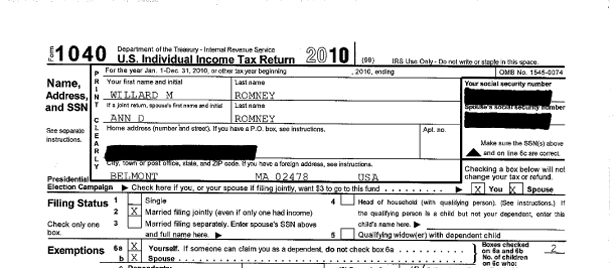
Mitt Romney’s 2010 tax return (Image courtesy of mittromney.com)
After weeks of hemming and hawing, Mitt Romney has finally released some of his tax returns. In 2008 Joe Biden released ten years’ worth of tax returns. When running for president in 1968 Romney’s father George Romney released returns for twelve years. Romney released just the returns for one, 2010.
In 2010 Romney paid only 13.9 percent in federal taxes on his income of $21.7 million. Does that sound low to you? It should. The highest marginal income tax rate is 35 percent. But Romney has the good fortune to live off unearned income. “It’s slightly lower than the total payroll, excise and lowest marginal income tax rates combined paid by Americans earning between $40,000 and $50,000 per year,” noted Ed Kleinbard, a law professor at the University of Southern California on a call organized by the Democratic National Committee.
The reason is that our tax code gives preferential treatment to unearned income, such as dividend payments and capital gains. Capital gains, which are overwhelmingly earned by the wealthiest Americans, are taxed at only 15 percent. That’s why, as Brad Plumer shows at the Washington Post, our wealthiest presidential candidates have often paid the lowest rates. This is obviously unjust. The argument in favor of this policy is that it encourages investment and by extension economic growth. Unfortunately, it’s not true: the economy has grown the most during periods when the capital gains tax rate was closest to the income tax rate. That’s why, as I’ve argued before, liberals should make taxing capital gains as regular income a top priority and a major deficit reduction proposal.
Conservatives, naturally, have found an intellectually dishonest justification for Romney. They argue that since Romney’s dividend income was first taxed as corporate income, “a competent campaign, and candidate, would explain that Romney’s real federal tax rate on his investment income was more than 40 percent (being conservative, after deductions and such), since the revenue stream was subject to both a personal tax rate and the corporate tax rate,” writes John Hood of National Review. “A competent campaign would then point out that state taxes would bring the effective income tax rate on Romney’s investment income to 50 percent or higher.”
Popular
"swipe left below to view more authors"Swipe →
The Wall Street Journal editorial page made the same argument. But, as Timonthy Noah points out in The New Republic, this is just hypocrisy. Corporations are separate legal entities from their owners. When corporations lose money, their owners are not personally liable. Conservatives have taken this idea to its logical extreme, as in the recent Citizens United Supreme Court decision, holding that corporations have the same First Amendment rights as individuals and so their spending on political messaging cannot be limited.
But if corporations are legally separate entities, then they obviously should pay taxes separately too. It’s also worth noting that if you are a housekeeper paid out of your employer’s after-tax income, conservatives never argue that your effective income tax rate is doubled and you should receive a special exemption. Everyone’s income taxes come from somewhere that may have been previously taxed – businesses are paid by customers using their after tax income—but conservatives object only when it’s a rich person, in the form of corporate profits or capital gains, who is subject to “double taxation.”
Romney will be hit for other aspects of his tax returns. Some of these are valid grounds for questioning Romney’s patriotism, such as his offshore accounts in Switzerland and the Cayman Islands. Others are just examples of Romney playing by the current, immoral rules of the game, such as his availing himself of the “carried interest” loophole that allows him, like hedge fund managers, to be paid deferred salary from Bain Capital in the form of capital gains.
The real problem is not that Romney takes advantage of the current system, it’s that as president he would make it worse. Romney proposes cuts in social spendingto pay for lowering taxes on the wealthy.. “Romney pays a lower tax rate than most police and firefighters and he doesn’t want that to change,” notes DNC executive director Patrick Gaspard.
But it’s also important to keep Romney’s taxes in perspective: as Romney noted at Monday’s GOP debate, his main opponent, Newt Gingrich, proposes a wildly regressive tax scheme that is infinitely more beneficial to Romney. Gingrich would eliminate capital gains taxes altogether. As Romney pointed out, he would pay zero percent in taxes under that program.


